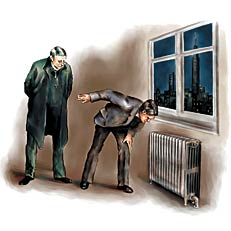And I am not talking about how to get the old school radiators in my office to stop all that loud banging when they heat up. (That is technically known as Steam Hammer.)
There’s a funny look people get on their face when they use the line: let’s turn STEM to STEAM! It’s a cute little smile, like they just said something really clever. It’s a fine line however, between clever and cute, at least as in “being a bit too cute.”
It’s the latest attempt to wedge the arts into something else. One day it’s STEM the next day it’s 21st Century Skills.
Okay, fair enough, I am guilty many, many times over for having deployed what I like the call the Malcolm X/Jean Paul Sartre approach to arguing for arts education: by any means necessary. And by that I mean that I would recite any argument that would have a shot at hooking a particular audience. Math test score improvement?I have one. ELA test score improvement? I have one. SAT score improvement? Got it. Direct link to increasing graduation rates…not so fast! Economic engine? I have one. Feel free to stop me.
So, what exactly is he talking about, some of you may wonder, if you’re still reading today’s mini-rant. Well, STEM is the movement around bolstering the following subjects in K-12 and post secondary education: Science, Technology, Engineering, and Math. These subjects are getting a lot of real (as in not fake) support from the Obama administration. This means money and policy. It’s is an important component of the Race to the Top program and other funding programs coming out of the USDOE.
The idea here is for the arts to be incorporated as the fifth Beatle of STEM, hence STEAM. But, as you know, there was no such thing as a fifth Beatle, something Pete Best discovered the hard way after he was replaced by Ringo Starr.Even George Martin will tell you that there is no fifth Beatle.
So, what’s my problem, and why is it taking me so long to get to the point, you may be wondering. Well, while I am all for making new friends with those in the STEM subjects, some of whom don’t really need new friends nor new funding, nor new policy girding (see math!), I am not wild about forsaking the role of the arts as part of a well-rounded education. What about physical education, foreign languages, history, etc., other subjects the arts are also a part of? Do we want to be part of leaving them behind? Is this just another moment of us hitching our wagons to the latest thing?




the answer to your “rhetorical” question is yes, of course. Yet another bandwagon to jump on hoping the laws of possibility will yield more attention and more loot. Now there’s an arts education theory that needs testing!